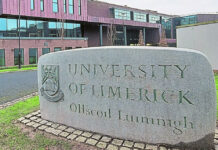
NEW University of Limerick (UL) research has revealed the “most effective” way to diagnose maternal sepsis, according to a new study.
The study, led by a team of researchers at the Castletroy-based institution, along with researchers from University Maternity Hospital Limerick, found that testing placental swabs can provide critical information for guiding antimicrobial treatment.
The findings were recently published in the PLOS ONE academic journal.
Led by Professor Colum Dunne, the study analysed over 2,000 bacterial culture results that were collected from more than 400 women as part of a ‘septic screen’, which detects bacteria that may cause maternal infections and can lead to sepsis.
“Maternal sepsis may occur during pregnancy or when a C-section incision, tear, or other wound from childbirth becomes infected in the days or weeks after giving birth,” said Professor Dunne.
“This study provides new information on how sepsis can be detected, and the organisms involved identified early, so that the best approach to successful treatment can be selected.”
Professor Dunne explained that “by looking at the results of each of these specimens from 430 women, they could be compared to determine which detected the highest pathogen numbers and, in this study, placental swabs were found to be the most effective.”
“These findings are very significant as these swabs are not always tested in hospitals. Due to this, important information that could be used in treatment choice for these infections could be missed.”
Maternal or perinatal sepsis is a well-recognised risk and a condition affecting over 20 million women and causing 17,000 deaths annually.










